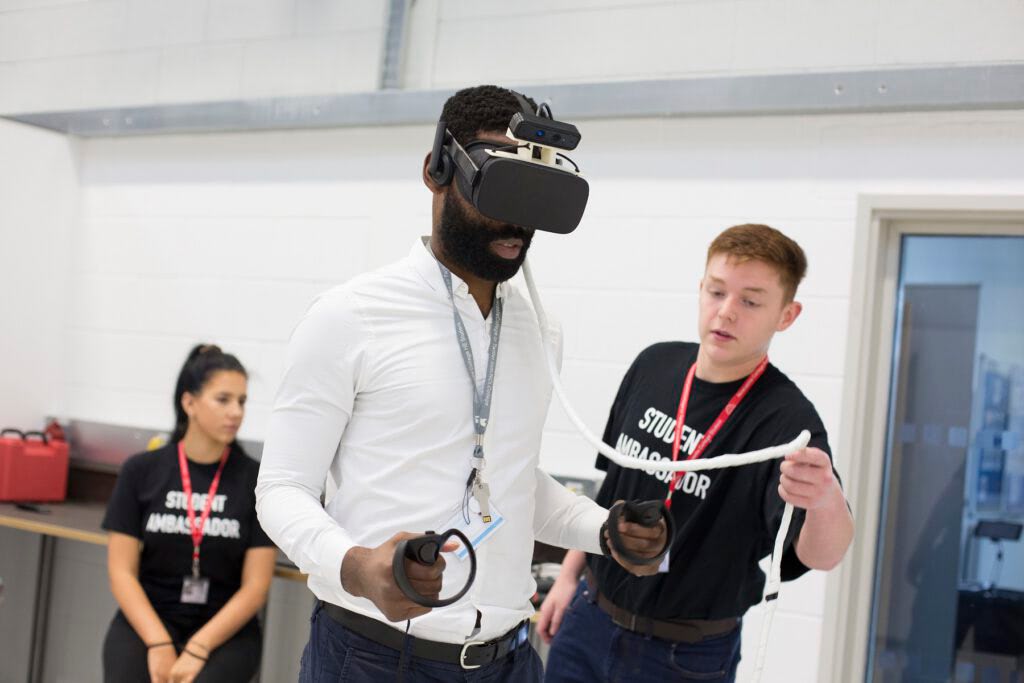An Innovative Approach to Developing a Talented Workforce of the Future

Jon Ridley (Vice – Principal and Executive Director of Higher Education) and Andrew Esson (Director of Industrial Strategy) discuss the innovative steps forward that Newcastle College is taking to develop a digital and leading workforce for the future of the region.
Those outside of the further education sector may not immediately associate ‘innovation’ and ‘designing the future’ with their local college.
They might actually be surprised to find out that colleges like Newcastle College (and its University Centre) are taking huge strides forward and using advanced technologies, developing innovative qualifications and developing a talented workforce for their region.
At Newcastle College we’ve always been passionate about driving talent and skills that translate to real careers and meet the needs of employers in our region and beyond.
We achieve that in a number of ways:
- We’re part of NCG, one of the largest education groups in the country. The aim of the group as a collective is to provide support for our respective regions and make local impact that together will make a big difference on a national scale. Being part of that group allows us to share resources and best practice, celebrate each other’s successes and support each other to innovate and grow.
- Our Chief Executive Liz Bromley sits on the Business Growth Board of the North East Local Enterprise Partnership (LEP), which allows us to have a strong voice, play a central role and ensure that we stay aligned with the current and future needs of the region – so that we can develop our own plans to support them.
- We also work closely with industry leaders. Whether that’s supporting collectives such as Dynamo and Digital Union, forging partnerships with engineering employers such as the Port of Blyth to share facilities, or creating a Digital Advisory Board to shape our course content, those relationships are central to everything we do and they help us to design and develop qualifications that offer the right skills and experience.
- Finally, we invest in our facilities so that our students learn in real working environments, using the latest equipment and technologies that they’ll find in industry.
None of that may sound particularly ground-breaking, but what it enables us to do is develop innovative solutions to skills shortages that may not even exist yet. By working closely with industry and local leaders, we can identify the skills and experience that are in real demand and respond by creating unique opportunities to gain those skills.
Just one example of that is the recent launch of our brand-new Foundation Degree in Engineering with Applied Digital Technologies. The two-year course is a direct response to our industrial engagement identifying an increase in local manufacturers adopting emerging industrial digital technology, creating a digital skills gap in the sector.
Developed with the help of our Digital Advisory Board, Procter and Gamble and the expertise of local engineering specialists Soil Machine Dynamics Ltd (SMD) and Metrology Software Products (MSP), it is tailor made to meet the demands of the sector and supports the region’s Local Industrial Strategy for Advanced Manufacturing by linking engineering principles with digital skills, to equip a new generation of highly-skilled and digitally-enabled engineers.
Last year, that same Digital Advisory Board helped us to recognise that our region’s digital sector needed an effective way to recruit talent who are ready to work and contribute quickly.
Working in partnership with digital powerhouse Accenture, we developed and launched the Digital and Technology Solutions degree apprenticeship. The first of its kind in the UK, this apprenticeship is a unique fast-track programme that helps apprentices to become fully qualified in just two years, rather than the traditional three.

Just a few weeks ago, the government announced the ‘Build Back Greener’ plan, promising substantial investment into renewable energies and the offshore wind sector. This is something that has been at the top of the region’s priorities for years and Newcastle College’s Energy Academy has been open since 2012 – a dedicated facility to train engineers specifically for the offshore and renewable energies industry.
The relationships that we’ve forged within the sector have led to amazing opportunities for our students training to be engineers within renewable energy and ensure that we are ready to respond to a growing demand for skills training in the industry.
Our students have access to real working facilities and industry leaders at Port of Blyth, and train using world-leading technology at our Energy Academy, (where the world’s most immersive Hybrid Reality (iHR) wind turbine training platform is housed), thanks to our partnerships with ORE Catapult and the Port.
These are just a few examples of the courses we’re building to train and upskill talent to meet the unique demands of the current economic climate.
Our approach is about developing real and powerful solutions to new and future problems, supporting our region, our local employers and our young people. It enables us to offer our students an educational experience that will put them in the best position possible when they leave us, whether that is through further education, higher education or an apprenticeship – all of them benefit from hands-on learning and fantastic support, alongside work-based opportunities and industry-linked activities.
We’re changing the face of education so that it really meets the future needs of employers in the North East and helps people learn the skills they need, quickly and efficiently.
Looking ahead to the next six or twelve months, it is colleges that will step up to skill, reskill and upskill to support our recovery from this current crisis, both locally and nationally. Newcastle College is perfectly placed and ready to do that.
Jon Ridley (Vice – Principal and Executive Director of Higher Education) and Andrew Esson (Director of Industrial Strategy)












Responses